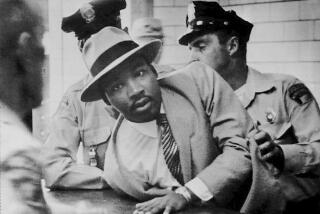A Wounded Soldier in the War on Error
This is the time of year when I add up my errors and either deny them, apologize for them or rationalize them away.
As some readers may remember, I always allow myself only two errors of fact, or two grammatical errors a year.
Few other columnists dare make that boast. This is a precarious business. One is always writing about something that one knows absolutely nothing about, and so one tends to fall into the abyss of oneâs own ignorance.
One of my problems is that I donât keep records of my errors, and so I am obliged, at yearâs end, to call them forth from memory, which tends to bury them. As far as I can remember, I have made only two this year--both in a recent column about a test given his students by Mike Eberts, a Glendale Community College teacher, on famous persons.
Eberts noted that Martin Luther Kingâs name was one of only two that every student recognized, and I quoted him as saying: âMy most pleasant surprise was to find that nearly 10 years after Dr. Kingâs tragic death, students unanimously knew who he was and what he stood for.â
As almost everyone knows, Dr. King was shot nearly 20 years ago, not 10. I have received several complaints about that error, including this one from David R. Moss: âEither Mr. Eberts is as hazy in arithmetic as some of his students are in âidentificationâ or one of your type-setters is as hazy in identification as some of the students. Or else youâre hazy at proof-reading your column. Whatever the explanation, letting this boner appear in print is a tasteless slap in the face (in my book) to Dr. Kingâs memory and to blacks as a whole.â
I hoped to find that Eberts had committed the original sin, which would have been small solace, but I received this note from him: âI think we are about to be descended upon by a swarm of sharp-eyed historians and civil rights activists who will note that it has been nearly 20 years since Martin Luther Kingâs death in 1968, not 10 years (I checked a copy of the letter I sent you. It said 20 years, not 10.)â
So the error is mine. Moss should know that newspapers no longer have typesetters, and that one reads proof on a computer screen, not in type. It was obviously a typographical or computographical error--mine; an egregious one, indeed, but hardly less egregious than Mossâ imputation of tastelessness. In no way can a typographical error reflect taste.
Even if the error had been one of ignorance on my part, rather than simple carelessness, I canât see that it could be taken as âa slap in the faceâ to Dr. Kingâs memory or blacks as a whole. Catastrophes always seem recent; we condense the intervening time; and it is as hard to realize that Dr. Kingâs death took place nearly 20 years ago as it is to realize that John Kennedyâs death took place a quarter of a century ago.
A far worse error, it seems to me, was in my remark that âIn these days when news spreads at the speed of sound, fame is only a tick away from any of us.â
Incredibly, no one wrote to point out that news does not spread at the speed of sound, as it did in George Washingtonâs day; it spreads at almost the speed of light .
Sound travels at about 1,128 feet a second, which is why you can see an explosion a mile away and not hear the sound until five seconds later. But light travels at 186,282 miles a second; the news of Gary Hartâs indiscretion traveled around the globe about seven times in one second. (It is axiomatic that bad news travels faster.)
I have of course, as usual, been accused of assorted errors of grammar, syntax and diction, but mostly the criticisms were pedantic, quaint or erroneous.
Just the other day I received the following complaint from Nathan Rothstein of Rosewood Avenue: âFor many years now, Iâve observed that many careful writers, such as you, have been following the copulative verb with an adverbial clause. When I was in high school this usage was considered a serious grammatical mistake.â
Gosh, I didnât even remember that verbs copulated.


